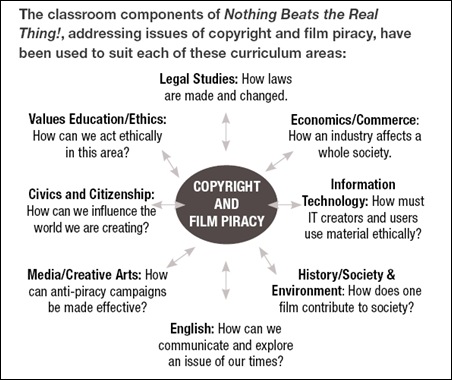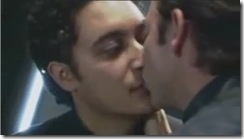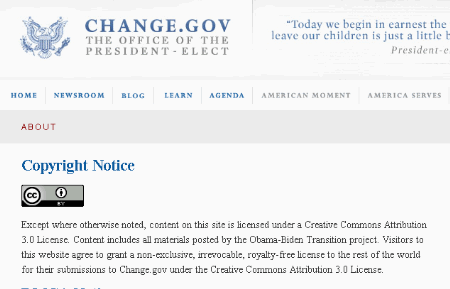Home » politics (Page 15)
Category Archives: politics
BSG, the last webisodes, and being gay in the rag-tag fleet
As a dedicated Battlestar Galactica fan I can’t wait for the final episodes to start in January and I’m already enjoying the countdown webisode series, ‘The Face of the Enemy’ which features Felix Gaeta, two Cylon Eights (Sharon’s model) and a few very desperate, very lost, BSG crew. The first webisode went live today and sets up an pretty engaging storyline. It also featured one other bit of story that’s sure to get a reaction:
On his way off the Galactica, to catch a raptor to another ship of a bit of leave, Felix Gaeta says goodbye to Hoshi and they lock lips which is the first visible and openly gay male relationship in the series. (There are other mentions of gay couples, although the most notable lesbian relationship was between Admiral Cain and the poor Six who eventually turns up horribly tortured on the Pegasus; this left more than a few questionable readings possible about the consequences of non-heterosexual relationships!) I’m very much in two minds about the outing of Gaeta; I’m delighted that his sexuality is basically treated as completely normal – the big issue is Hoshi smuggling some painkillers to Gaeta, while their relationship seems normalised (or as normal as anything gets on the rag tag fleet). That said, I wonder if Ron Moore and the producers are playing it too safe leaving this sort of material for the webisodes? Their nature as online add-ons might just mean that the writers are allowed to push boundaries they can’t during the actual episodes (and kudos to Jane Espenson and Seamus Kevin Fahey for writing this webisode series), but for this to be a powerful and clear statement about the normalisation of same sex relationships in the world of Galactica, I’d really like to see this thread continue into the final episodes and actually screened on television, not just pushed to one side on the web.
For international viewers, we’re once again victims of the tyranny of digital distance as the webisode are geo-locked and only visible to those with US IP addresses; there will be lots of workarounds, no doubt, but for a short time until it’s pulled, the first webisode is available on YouTube.
Update: Apparently in the run of webisodes we find out Gaeta is bisexual, not gay; I’m not sure if this depletes the overall message or not … probably not.
Obama’s Change includes embracing the Creative Commons
While Obama’s policies were very much pro-Net Neutrality and open access during the campaign, it has taken a little while to see these policies in action (although, to be fair, he’s not actually President yet). Today, though, an important step: Obama’s transition website, change.gov is now licensed under a Creative Commons Attribution license, meaning the information can be shared, reused and repurposed by pretty much anyone, as long as they note where the information came from. Here’s a capture of the website’s copyright notice:
Admittedly there was some confusion because all official federal government websites in the US are supposedly in the public domain, but is a president-elect bound by these rules? The answer seems ambiguous, but the CC BY license, apart from requiring attribution, is pretty much as good as the public domain anyway. Creative Commons heavyweights Lawrence Lessig, Joi Ito and Cory Doctorow have all expressed their delight at seeing Obama’s transition online presence sporting a CC license. I’m delighted, too, and can’t help but think that it would be marvellous to see more of Australia’s government websites and documents under Creative Commons licenses, too! And since Kevin Rudd has styled his own online presence on Obama’s, perhaps his information sharing policies could follow suit rather than being misdirected by this ridiculous internet filtering regime.
Annotated Digital Culture Links: December 1st 2008
Links for November 28th 2008 through December 1st 2008:
- Survey: We luv Australian telly [TV Tonight] – The Australian Broadcasting Corporation (ABC) has released the results of a Newspoll survey in its campaign for increased funding from the federal government. The survey conducted nationally for the Media, Entertainment & Arts Alliance, found:
– 64% of Australians think the government should regulate the minimum amount of Australian programmes shown on Free to Air.
– 69% believe the government should regulate a minimum amount of Australian programming on the ABC.
– 64% believe it is important Australian programs can be accessed through new media platforms.
– 65% want increased funding for Australian children’s shows on the ABC.
– 64% favour increased funding for more Australian drama programs on ABC.
– 79% wanted more funds for Australian documentaries on ABC. - Children’s welfare groups slam net filters [The Age] – “Support for the Government’s plan to censor the internet has hit rock bottom, with even some children’s welfare groups now saying that that the mandatory filters, aimed squarely at protecting kids, are ineffective and a waste of money. Live trials of the filters, which will block “illegal” content for all Australian internet users and “inappropriate” adult content on an opt-in basis, are slated to begin by Christmas, despite harsh opposition from the Greens, Opposition, the internet industry, consumers and online rights groups. Holly Doel-Mackaway, adviser with Save the Children, the largest independent children’s rights agency in the world, said educating kids and parents was the way to empower young people to be safe internet users. She said the filter scheme was “fundamentally flawed” because it failed to tackle the problem at the source and would inadvertently block legitimate resources.” (So, is anyone, apart from the government, actually in favour, then??)
- Seven forces Rafters fansite to shut [TV Tonight] – “The Seven Network has muscled in on a fan website packedtotherafters.com.au run by an 18 year old fan, after it deemed his site would cause confusion with the show’s official website. Seven’s own website is at the clunky address http://au.tv.yahoo.com/b/packed-to-the-rafters/ But now the network wants the webmaster, Michael, who started the site based on his love of the new Seven drama, to close down the site and hand over the domain. Michael says he was shocked when he read the email from Seven lawyers. “I couldn’t believe they required me to hand over the domain which mean shutting down the entire site,” he told TV Tonight. … But a disappointed Michael is complying with the request, saying he can’t afford to take Seven on legally.” (Ah, Channel 7, prosecuting your most ardent fans … how NOT to build a fan base for your shows.)
- Google’s Gatekeepers [NYTimes.com] – A fascinating look inside Google’s legal operations, and how they strike the balance between respecting freedom of speech while responding to different political and legal systems around the world. (And how sometimes “don’t be evil” means you don’t exist – at least, that’s why there’s no YouTube in Turkey.)
- Tweeting the terror: How social media reacted to Mumbai [CNN.com] – “The minute news broke of the terrorist attacks on Mumbai, India, social media sites like Twitter were inundated with a huge volume of messages. With more than 6 million members worldwide, an estimated 80 messages, or “tweets,” were being sent to Twitter.com via SMS every five seconds, providing eyewitness accounts and updates. Many Twitter users also sent pleas for blood donors to make their way to specific hospitals in Mumbai where doctors were faced with low stocks and rising casualties. Others sent information about helplines and contact numbers for those who had friends and relatives caught up in the attacks. Tweeters were also mobilized to help with transcribing a list of the dead and injured from hospitals, which were quickly posted online. As Twitter user “naomieve” wrote: “Mumbai is not a city under attack as much as it is a social media experiment in action.””
- Macy’s Thanksgiving Day Parade Gets Rickrolled [NewTeeVee] – Is this the [US] first nation-wide Rickroll? Never let it be said again that the Macy’s Thanksgiving Day Parade is out of touch — this morning the Foster’s Home for Imaginary Friends float surprised, well, the entire nation with Never Gonna Give You Up and the ACTUAL Rick Astley, for the first time (as far as I know) complicit in a live Rickroll.
Annotated Digital Culture Links: November 26th 2008
Links for November 26th 2008:
- Obama’s Video Strategy: A Peek Behind the Curtain [NewTeeVee] – “During the 2008 presidential election, the Barack Obama campaign set up dedicated new media teams in many states, but there were only eight with dedicated videographers: Pennsylvania, Virginia, Colorado, North Carolina, Florida, Michigan, Ohio and Wisconsin. What do those states have in common? They were key swing states — and on Nov. 4th, Barack Obama won every single one. I recently spoke with with Kevin Hartnett, director of new media for the Pennsylvania campaign … In this election cycle, the incorporation of online video as part of a wider new media strategy was clearly revolutionary — even to those involved. “This was not something the political professionals on the campaign had had before,” Hartnett said. “” (Fascinating look at how important social software, online campaigning and the cheap’n’easy nature of digital video was to Obama’s largely grassroots campaigning.)
- Preview of my Television & American Culture book [Jason Mittell / Just TV] – Television and American Culture, forthcoming from Oxford University Press, copyright by Jason Mittell. Introduction: Why Television? Section 1: Television Institutions Chapter 2: Exchanging Audiences Chapter 3: Serving the Public Interest Chapter 4: Televised Citizenship Section 2: Television Meanings Chapter 5: Making Meaning Chapter 6: Telling Television Stories Chapter 7: Screening America Chapter 8: Representing Identity Section 3: Television Practices Chapter 9: Viewing Television Chapter 10: Television for Children Chapter 11: Television’s Transforming Technologies Conclusion: American Television in a Global Context (The introduction is online; looks like a possible textbooks for Digital Media.)
- Web Suicide Viewed Live and Reaction Spur a Debate [NYTimes.com] – “For a 19-year-old community college student in Pembroke Pines, Fla., the message boards on BodyBuilding.com were a place to post messages, at least 2,300 of them, including more than one about his suicidal impulses. In a post last year, he wrote that online forums had “become like a family to me.” “I know its kinda sad,” the student, Abraham Biggs, wrote in parenthesis, adding that he posted about his “troubles and doubts” online because he did not want to talk to anyone about them in person. Last Wednesday, when Mr. Biggs posted a suicide note and listed the drug cocktail he intended to consume, the Web site hardly acted like a family. On BodyBuilding.com, which includes discussions of numerous topics besides bodybuilding, and on a live video Web site, Justin.tv, Mr. Biggs was “egged on” by strangers who, investigators say, encouraged him to swallow the antidepressant pills that eventually killed him.”
Queen Rania of Jordan … and YouTube
I must confess my knowledge of Jordan is pretty limited and, to my shame, the only time I’ve ever heard of Queen Rania was in a list of powerful women I read in a magazine (while waiting to get a haircut I think); at the time I was mildly surprised to see a Jordanian woman is any sort of position of power – and it’s exactly that sort of attitude Queen Rania has apparently been trying to overcome with her YouTube channel (and lots of other stuff, too). Still, until yesterday I’d never actually seen one of her videos until I was sent her witty acceptance video for YouTube’s first YouTube Visionary Award:
If her vision was to offer a wake-up call to lazy stereotypes about women in Muslim societies, then I’d say she achieved her aim admirably. To see an example of her frank, direct and very engaging video blogging style, check out ‘Jordan’s Queen Rania on Arab women’; not only does she have a really convincing presence on camera, but (unlike most politicians’ for example) she leaves her YouTube comments enabled and she actually responds to many of them – that’s what participatory culture is all about!
AFACT vs iiNet (and convincing Australia’s teenagers they’re pirates)

As most people in Australia would now be aware, one of the most important developments in terms of civil rights and the Australian internet has now gone before the courts as a consortium, led by the Australian Federation Against Copyright Theft (AFACT) is suing ISP iiNet for refusing to cut off customers for alleged (not proven!) copyright infringement in terms of bittorent media downloads. From the Age:
The Australian film and television industry has launched a major legal action against one of Australia’s largest internet service providers for allegedly allowing its users to download pirated movies and TV shows. The action against iiNet was filed in the Federal Court today by Village Roadshow, Universal Pictures, Warner Bros, Paramount Pictures, Sony Pictures Entertainment, 20th Century Fox, Disney and the Seven Network. Mark White, iiNet’s chief operating officer, said the company did not support piracy in any form but it could not disconnect customers just because the movie industry claimed they engaged in illegal downloading. Adrianne Pecotic, executive director of the Australian Federation Against Copyright Theft (AFACT), said the action followed a five-month investigation by the industry.
There are also arguments made that peer to peer networks should simply be blocked (although that argument hasn’t been in quit those terms just yet in this case) but that serves as a good opportunity to remember that p2p and, yes, even bittorent, are not intrinsically for distribution of ‘pirated’ media; there are plenty of things, including feature films, being distributed via peer to peer networks which are entirely legal!
One thing this case should, hopefully, achieve, is to test the extent to which recently imported ‘safe harbour’ provisions actually stand up in an Australian court:
"This is a very important test case for the internet industry in Australia," said Peter Coroneos, chief executive of the Internet Industry Association. "It will test the effect of the safe harbour provisions that were introduced with the US free trade agreement, which provides immunity for ISPs in certain circumstances such as transmission, hosting, caching and referencing activities."
However, as this article from Michael Sainsbury and Fran Foo in Australian IT notes, the lawsuit seems to stand on pretty thin legal grounds (disclaimer: I ain’t no lawyer!):
iiNet managing director Michael Malone said when it received AFACT’s complaints, they were forwarded to the Police. "But AFACT refused to talk to the Police," Mr Malone said. Ms Pecotic brushed aside Mr Malone’s explanation, saying: "The law is clear and iiNet knows that. They cannot pass the buck … it is their responsibility." "There were many things that iiNet could have done and at the very least, issue a warning to the customers involved but they did nothing," she said. Unlike a number of other major jurisdictions such as the United States and Britain, Australia does not have blanket agreement between content companies and broadband providers about file swapping. An Optus spokesperson said that under Australian law there are remedies available to copyright holders, including taking action directly against those alleged to be infringing rights. "It is unfortunate that the rights holders are targeting an ISP because under Australian law, internet service providers may generally be considered conduits which provide carriage services, and as such are not responsible for copyright infringements carried out by customers using their internet services,” the spokesperson said. This position is reflected in sections 39 (B) and 112 (E) of the Copyright Act 1968 (Com), and in the safe harbours set out in Division 2AA, which were introduced protect ISPs from being onerously required to enforce intellectual property rights where they are merely providing carriage services.
On the smaller screen front, TV Tonight notes that Channel 7 is part of the group attacking iiNet, although reading the comments on the TV Tonight post, this action seems to have focused even more people’s feeling that they are downloading television shows because local networks simply aren’t providing the goods in a timely or consistent fashion!
iiNet’s own response seems the most sensible part of this whole debacle:
iiNet’s Managing Director Michael Malone said iiNet does not in any way support or encourage breaches of the law, including infringement of copyright. “In reality, iiNet has been leading the industry in making content available legally through our Media Lounge, including agreements with iTunes, ABC iView, the West Australian Symphony Orchestra, Cruizin’, Macquarie Digital TV, NASA Television, Barclays Premier League football, Drift Racing 2007 and classic highlights of golf’s four Majors,” Mr Malone said. Mr Malone said iiNet had not breached any laws and had repeatedly passed on copyright holders’ complaints to law enforcement agencies for investigation. He said iiNet had advised the Australian Federation Against Copyright Theft (AFACT) that their complaints had been forwarded to law enforcement agencies and that they should follow the matter up with them. iiNet’s Customer Relations Agreement clearly spells out that customers must comply with the law and that our service must not be used “to commit an offence or to infringe another person’s rights”. “iiNet cannot disconnect a customer’s phone line based on an allegation. The alleged offence needs to be pursued by the police and proven in courts. iiNet would then be able to disconnect the service as it had been proven that the customer had breached our Customer Relations Agreement,” Mr Malone said.
Relying on the idea that customers are innocent until proven guilty? Whatever is iiNet thinking?
At the same time this lawsuit was announced, AFACT released the following ‘resource’ – Nothing beats the real thing! How copyright, creativity and citizenship shape our society (subtitle: Film Piracy – Your Actions Can Make a Difference) – which has been mailed on DVD and hardcopy to every secondary school in Australia. The ‘resource’ is structured around addressing film piracy; the ‘civics lessons’ here are, at best, tailored to a very specific commercial aim and, at worst, an advertising campaign trying to make relevant copyright laws which have long since been dismissed as out of touch by the most teenagers. More to the point, a genuine civics lesson on copyright would spend considerable time discussing fair dealing, the public domain and the Creative Commons (and other copyleft licenses) as a channel for personal and political creativity and expression (to be fair, both of these things are mentioned in the ‘resource’, but a single paragraph hardly does the Creative Commons justice, especially when it spend half the time emphasising that CC licenses are complex: “There are lots of different types of ‘Creative Commons’ licences, so make sure you always read the terms and conditions of these before applying them to your work or using material licensed under such a licence.”). How central is film piracy to these civics lessons? The lesson structure:

Is the ‘resource’ balanced? I’ll leave you take a look for yourself (6Mb PDF), but I’ve never read an educational resource before which feels the need to include this disclaimer (p. 4.):
The resource is not a propaganda exercise. It does make clear to students that there are harmful consequences from film piracy, but it does so through educationally valid processes. It is an educational approach that allows students to face a significant civics and citizenship issue: their role in a society where many of them and their peers are breaking the law.
All I can say is I’d be really, really disappointed if this was the only resource secondary school teachers were provided when integrating lessons which combine copyright, creativity and civics in the classroom.
[Photo: ‘ars electronica linz 2008’ by Mike from Zurich CC BY (Edited)]
Update: Kim Weatherall has a detailed legal (and possibly more balanced) look at the case here. [Via Peter Black]
Update 2: After writing the EFA response, Nic Suzor has a very robust look at the case on his blog, too.


